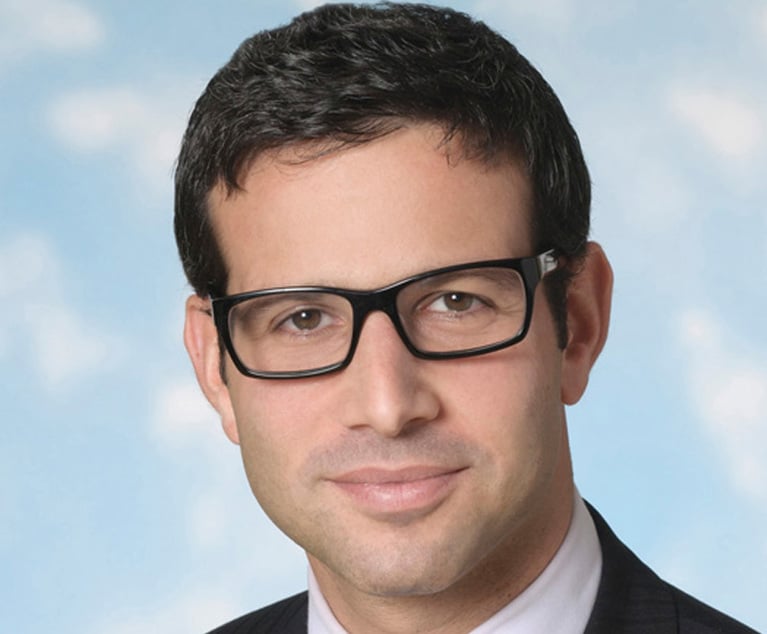Women Ascend to Leadership Ranks at the Biggest Metro Bar Associations in Texas
All five of the Lone Star State's biggest metropolitan area bar associations are currently run by women executive directors.
February 27, 2019 at 06:00 AM
6 minute read

Although the female attorneys of Texas, just like their nationwide peers, are still limited in their ascent to the upper echelon in law firms and corporations, their counterparts within local bar associations are finding better leadership opportunities.
All five of the Lone Star State's biggest metropolitan area bar associations are currently run by women executive directors. Two of them, Kay Sim of Houston and Delaine Ward of Austin, have been at their posts for 30-plus years, while the remaining three—Alicia Hernandez of Dallas, Megan Cooley of Tarrant County and June Moynihan of San Antonio—all took over after longtime leaders retired within the past few years.
“It's wonderful we have them, because they deserved it. They are all qualified, but more than anything, they all have that spirit of caring about the community and its needs and searching with their boards on ways they can, as a profession, help those communities be better,” said Sim, executive director of the Houston Bar Association, the longest-serving of the bunch.
As the nation celebrates Women's History Month, it's a good time to reflect on how female attorneys have risen to the top of local bar associations, even while they continue to struggle to bust the glass ceiling in other areas of the legal profession.
Sim explained that because bar associations are tasked with representing the whole cross-section of the legal community—along gender, race and other diversity metrics—they're very sensitive to ensuring that diverse candidates have an equal shot at leadership.
“We strive to have that diversity. It's a conscious effort,” Sim said.
In the wider legal profession, more than half of law school graduates are women, nearly half of new associates in law firms are women, yet only 18 percent of equity partners are female, according to the American Bar Association. In top corporations, only 26 percent of general counsel are women. Many female attorneys tend to drop out when they have children, because the schedule doesn't mesh well with raising small humans.
There may be a perception that schedules are better in bar associations, because they're nonprofits, but it's not necessarily the case, said Moynihan, executive director of the San Antonio Bar Association. She said her staff of nine people—all of them are women—work very hard, although she does grant flexibility when anyone needs off work to take a child to the doctor or other things. No one holds it against them.
“I think the difference is maybe, because there are more women in leadership, we have sensitivity to it,” she said, adding that staffers tend to make up the hours by working nights. “To work at a nonprofit, you really have to be mission-driven. I have a nice team, and they all believe in our mission. I feel my job is almost making sure they don't burn out.”
Texas is not unique in having women running its local bar associations. The phenomenon actually follows a nationwide trend documented by the American Bar Association. For example, in 2017, women executive directors headed 12 of the 20 largest metro bars, and seven of the 20 largest state bars. State bars in Arkansas, Virginia and West Virginia are run by women, in New England, 4 out of 6 state bar executives are female and in the Western States Bar Conference, 8 out of 16 state bar executives are women.
The State Bar of Texas was run by a female executive director, Michelle Hunter, for 10 years before her retirement last year.
Karen Hutchins, president of the National Association of Bar Executives, has seen the transformation of bar executive directors first hand. In 2007, when she entered the industry as executive director of the Arkansas Bar Association, it was more rare to see women in the top post. But today, the gender ratio of NABE membership seems to be close to 50-50 male to female. Hutchins said she's pleased and happy to see the trend, because she's found that female bar executive directors are creative, organized and able to juggle multiple tasks. Like all diverse employees, they're able to bring a new perspective that improves bar decision-making.
“I think over the years people have come to realize that I think for whatever reasons that women have not had the opportunities in the past in the legal profession,” Hutchins said. “It's been a process of awakening.”
Meet the Female Bar Executive Directors
Kay Sim has been the longest-serving among the five female executive directors of the Lone Star State's five major metro bar associations. She recently announced her plans to retire on March 1 after working at the Houston Bar Association for 44 years—38 of them as executive director. In her tenure, membership grew from 5,900 members to 11,000 and its budget went from $540,000 to $2.5 million.
This year, DeLaine Ward, executive director of the Austin Bar Association, celebrated 35 years leading the association, which serves a metropolitan statistical area with 12,300 lawyers, according to State Bar of Texas data. Ward began her career in 1982 as an administrative assistant in the State Bar of Texas's Division of Bar Services before moving to the Austin Bar Association in 1984.
Alicia Hernandez, the executive director of the Dallas Bar Association, had worked there for 16 years before assuming the helm in January 2017—which puts her in charge of 24 staffers and a $4.3 million budget. Immediately before that, she was director of the Dallas Volunteer Attorney Program and director of the Lawyer Referral Service.
June Moynihan began leading the San Antonio bar in May 2017. For two years previous, she was membership director and San Antonio Bar Foundation director. She's originally from San Francisco and earned her law degree from the University of California, Hastings College of the Law in 1994.
Megan Cooley, executive director of the Tarrant County Bar Association, started as the organization's top leader in July 2017. Previously, she served as the association's pro bono programs director since 2014. But for most of Cooley's legal career, she was a litigator at Kelly Hart & Hallman in Fort Worth for 14 years.
Angela Morris is a freelance journalist. Follow her on Twitter at @AMorrisReports.
This content has been archived. It is available through our partners, LexisNexis® and Bloomberg Law.
To view this content, please continue to their sites.
Not a Lexis Subscriber?
Subscribe Now
Not a Bloomberg Law Subscriber?
Subscribe Now
NOT FOR REPRINT
© 2025 ALM Global, LLC, All Rights Reserved. Request academic re-use from www.copyright.com. All other uses, submit a request to [email protected]. For more information visit Asset & Logo Licensing.
You Might Like
View All
Kirkland's Daniel Lavon-Krein: Staying Ahead of Private Equity Consolidation

Vinson & Elkins: Traditional Energy Practice Meets Energy Transition
4 minute read
Advising 'Capital-Intensive Spaces' Fuels Corporate Practice Growth For Haynes and Boone
4 minute read
Get to Know Texas Lawyer's Attorney of the Year Finalists
Trending Stories
- 1Uber Files RICO Suit Against Plaintiff-Side Firms Alleging Fraudulent Injury Claims
- 2The Law Firm Disrupted: Scrutinizing the Elephant More Than the Mouse
- 3Inherent Diminished Value Damages Unavailable to 3rd-Party Claimants, Court Says
- 4Pa. Defense Firm Sued by Client Over Ex-Eagles Player's $43.5M Med Mal Win
- 5Losses Mount at Morris Manning, but Departing Ex-Chair Stays Bullish About His Old Firm's Future
Who Got The Work
J. Brugh Lower of Gibbons has entered an appearance for industrial equipment supplier Devco Corporation in a pending trademark infringement lawsuit. The suit, accusing the defendant of selling knock-off Graco products, was filed Dec. 18 in New Jersey District Court by Rivkin Radler on behalf of Graco Inc. and Graco Minnesota. The case, assigned to U.S. District Judge Zahid N. Quraishi, is 3:24-cv-11294, Graco Inc. et al v. Devco Corporation.
Who Got The Work
Rebecca Maller-Stein and Kent A. Yalowitz of Arnold & Porter Kaye Scholer have entered their appearances for Hanaco Venture Capital and its executives, Lior Prosor and David Frankel, in a pending securities lawsuit. The action, filed on Dec. 24 in New York Southern District Court by Zell, Aron & Co. on behalf of Goldeneye Advisors, accuses the defendants of negligently and fraudulently managing the plaintiff's $1 million investment. The case, assigned to U.S. District Judge Vernon S. Broderick, is 1:24-cv-09918, Goldeneye Advisors, LLC v. Hanaco Venture Capital, Ltd. et al.
Who Got The Work
Attorneys from A&O Shearman has stepped in as defense counsel for Toronto-Dominion Bank and other defendants in a pending securities class action. The suit, filed Dec. 11 in New York Southern District Court by Bleichmar Fonti & Auld, accuses the defendants of concealing the bank's 'pervasive' deficiencies in regards to its compliance with the Bank Secrecy Act and the quality of its anti-money laundering controls. The case, assigned to U.S. District Judge Arun Subramanian, is 1:24-cv-09445, Gonzalez v. The Toronto-Dominion Bank et al.
Who Got The Work
Crown Castle International, a Pennsylvania company providing shared communications infrastructure, has turned to Luke D. Wolf of Gordon Rees Scully Mansukhani to fend off a pending breach-of-contract lawsuit. The court action, filed Nov. 25 in Michigan Eastern District Court by Hooper Hathaway PC on behalf of The Town Residences LLC, accuses Crown Castle of failing to transfer approximately $30,000 in utility payments from T-Mobile in breach of a roof-top lease and assignment agreement. The case, assigned to U.S. District Judge Susan K. Declercq, is 2:24-cv-13131, The Town Residences LLC v. T-Mobile US, Inc. et al.
Who Got The Work
Wilfred P. Coronato and Daniel M. Schwartz of McCarter & English have stepped in as defense counsel to Electrolux Home Products Inc. in a pending product liability lawsuit. The court action, filed Nov. 26 in New York Eastern District Court by Poulos Lopiccolo PC and Nagel Rice LLP on behalf of David Stern, alleges that the defendant's refrigerators’ drawers and shelving repeatedly break and fall apart within months after purchase. The case, assigned to U.S. District Judge Joan M. Azrack, is 2:24-cv-08204, Stern v. Electrolux Home Products, Inc.
Featured Firms
Law Offices of Gary Martin Hays & Associates, P.C.
(470) 294-1674
Law Offices of Mark E. Salomone
(857) 444-6468
Smith & Hassler
(713) 739-1250






